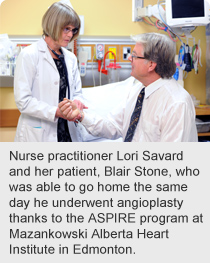
November 14, 2012
Story by Greg Kennedy; Photo by Dale MacMillan
EDMONTON — Blair Stone’s a busy guy, with a government job and a jam-packed calendar that typically leaves him little time to hang around hospitals or to fuss over things like a twinge in the chest.
“I was out walking my dog when I got this chest pain. Most men go into denial with this sort of thing, so I made excuses like it was indigestion,” says the Red Deer man. “I had no idea what the pain of angina was supposed to feel like. So I basically ignored it.”
But the pain became more prevalent and, in September, the 58-year-old found himself at the Mazankowski Alberta Heart Institute, where received a stent in the catheter lab to relieve an obstructed artery. What really amazed Stone, however, was the fact that he was able to go home the very same day.
Like Stone, heart patients with narrowing or blocked arteries are now benefiting from a new Alberta Health Services (AHS) outpatient program that restores blood flow and returns them to the comforts of home the same day.
The ASPIRE program, based at the Mazankowski, eliminates the traditional overnight hospital stay for most of these patients, freeing health care resources for the more seriously ill, while greatly adding to patient satisfaction.
“Our patients are stable patients who come from home and they’ve got narrowing or blockages of blood supply to the heart — but they haven’t had heart attacks,” says nurse practitioner Lori Savard, who oversees the program.
“Recent studies show that if a patient meets our criteria, it’s very safe for them to go home at the end of the day. The ASPIRE program reflects the latest research and our desire to keep our practices at the gold standard.”
Stone is impressed by the program.
“The staff, from my first welcome to the people doing the actual procedure, were all very professional with me,” he says. “They helped to ease my anxiety by kidding around a bit and made me feel right at home. I was in at 10 o’clock, in recovery shortly after noon, and released at 5 o’clock. I had no pain; I was awake for the whole thing. I remain absolutely in awe of what they can do.”
The ASPIRE program is for patients who require percutaneous coronary intervention, a minimally invasive method used to open narrowed arteries that supply the heart muscle with blood. A catheter is inserted into an artery through the arm or groin. At the leading tip of this catheter, several devices, such as a balloon, stent (tube) or cutting device, can be deployed at the site of narrowing or blockage.
“Traditionally, this type of patient was always held overnight and discharged in the morning. But if the case is very straightforward, no complications, then there’s no reason for them to stay overnight,” says Savard. “They don’t need to use the hospital bed and patients prefer to go home at the end of the day.”
After placement of an artery-widening stent, for example, the patients’ vital signs, access site and comfort level are carefully monitored. Patients are given information about their stent as well as new medications required. An initial consultation is organized with a cardiac rehabilitation nurse. After a defined period, the patient is encouraged to walk around the unit. If all checks out well over the observation period, the patient is discharged to home.
The program, piloted last year at the Mazankowski, has helped 70 patients to date and now sees up to 10 new patients each month.
Services such as the ASPIRE program also reflect the growing role of nurse practitioners at AHS. These highly qualified nurse specialists are able to diagnose, order tests, prescribe treatment and medication as they manage independent clinics and carry their own patient caseload.
“Having a nurse practitioner working within the interventional cardiology group has enhanced all aspects of patient care,” says Dr. Robert Welsh, Director of the Cardiac Catheter Lab. “This includes patient assessment prior to procedures, implementing best practices before and after the procedure, enriched patient teaching and improved communication with our referring physician colleagues. The ASPIRE program enhances patients’ well-being and sense of empowerment by facilitating same-day discharge combined with enhanced education about their condition.”
Savard agrees.
“A lot of time, when people come into hospital, we treat them like they’re sick,” says Savard. “We tend to dress them in gowns and make them not move, and tell them they can’t get up — even though they walked in here. With ASPIRE, we don’t need to institutionalize them. We keep them active and mobile even through this one-day program. In this sense, we ‘de-patient’ the patient.”
Stone says going home the same day was “fantastic.”
“I was even walking the next day — I walked a mile-and-a-half. Within a few days, I was up to five miles. And that’s what I’ve been doing ever since,” he says. “My dad had heart trouble 21 years ago, but treatment was a lot more invasive then, with open-heart surgery. He was in the hospital for six weeks, then off work for rehab at home for another four or five months. To go from that, to what we do now, is just mind-boggling to me.”
As part of his follow-up cardiac rehabilitation, Stone now attends heart-healthy lifestyle education classes and receives regular checkups from his primary care physician.